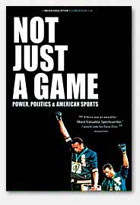
Not Just a Game: Power Politics and American Sports 2010
Distributed by Media Education Foundation, 60 Masonic St., Northampton, MA 01060; 800-897-0089
Produced by Chris Boulton, Jeremy Earp, Scott Morris & Jason Young
Directed by Jeremy Earp
DVD , color, 62 min.
Jr. High - Adult
African American Studies, Journalism, Popular Culture, Sports, Women’s Studies
Date Entered: 04/07/2011
Reviewed by Patricia B. McGee, Coordinator of Media Services, Volpe Library & Media Center, Tennessee Technological UniversityFrom Jesse Owens to Howard Cosell, the rubric of American culture has been that sports and politics don’t mix, yet Not Just a Game demonstrates that sports are pervaded with nationalism, militarism, and patriotism and the exact opposite of politically neutral. According to Dave Zirin, narrator and author of A People's History of Sports in the United States, “American sports culture shapes cultural attitudes, norms and power arrangements.” Sports are a “cultural force, a shared social space and a political force,” and where we go to understand our ideas about gender, race and class.
NFL football epitomizes the traditional male behavioral model—to inflict and endure pain, to win at all costs, to do whatever is necessary regardless of the consequences. Pro sport language, especially football, is filled with militaristic language: the quarterback is a general, players are warriors, and they penetrate enemy territory. The glamorized ideal masks terrible hidden consequences—NFL players with an average career of only 3.5 years die twenty years earlier than rest of the population. Zirin asks the fundamental question that if sports, with its fictionalized invulnerability, glamorizing and sanitizing war, is it in fact a form of propaganda?
Sports culture has a mentality that paints those who don’t fit its standards as somehow “unathletic, unworthy of sport,” and has “marginalized entire groups of people.” Ironically while Title IX has fostered women’s participation in sport from a 1 in 35 ratio to the current 1 in 3, media coverage has almost disappeared. In 2009 1.6% of sport air time was devoted to women; ESPN the Magazine had only six covers with female athletes during a five year span. Sports media coverage is “just another excuse to sell women’s bodies to male viewers.”
Not Just a Game deftly dissects sports culture, exposes the hypocrisy, and tells the story from multiple perspectives. A mix of archival and modern footage, contemporary interviews and trenchant commentary, it provides a superb overview of the very serious issues in sports—sexism, homophobia, commercialism, and subservience to corporate power. Sports are not just a game, rather sports culture reinforces negative attitudes that hurt people and restrict opportunities rather than honoring those like John Carlos, Tommie Smith, Billie Jean King, and Mohammad Ali who stood against injustice. Highly recommended for all collections and a must have for all sports education programs.